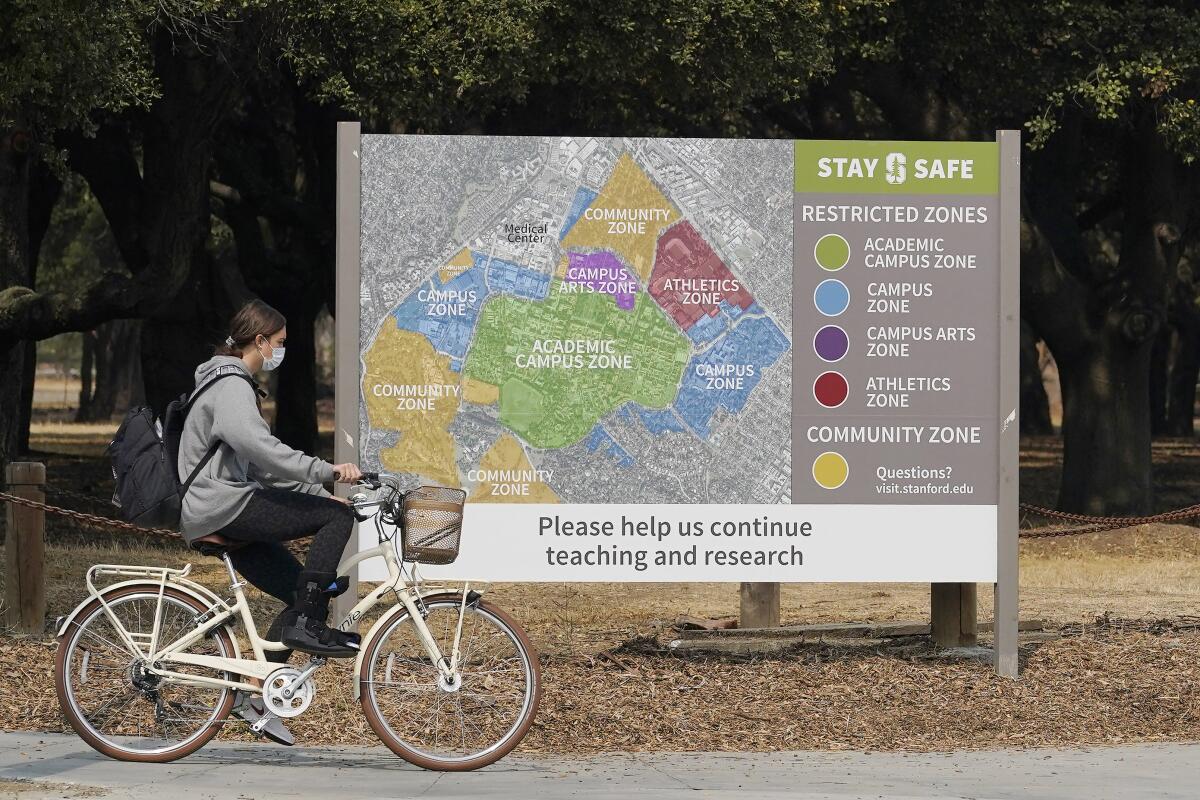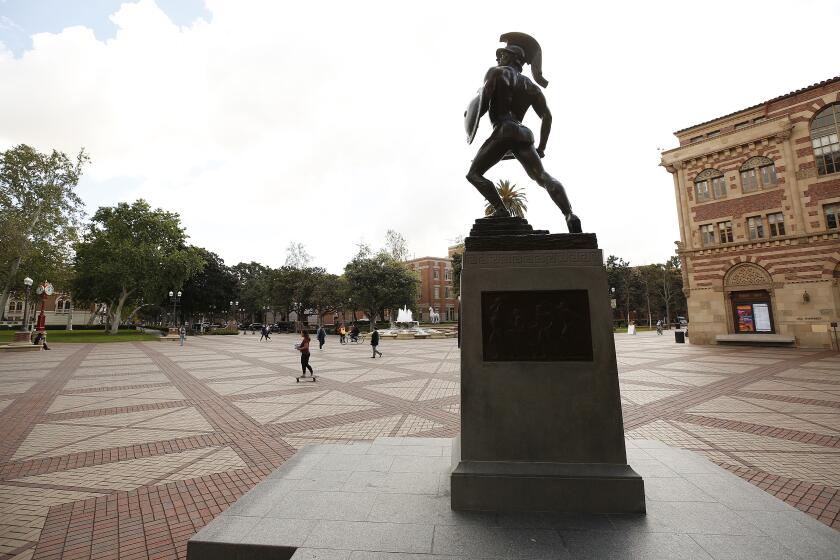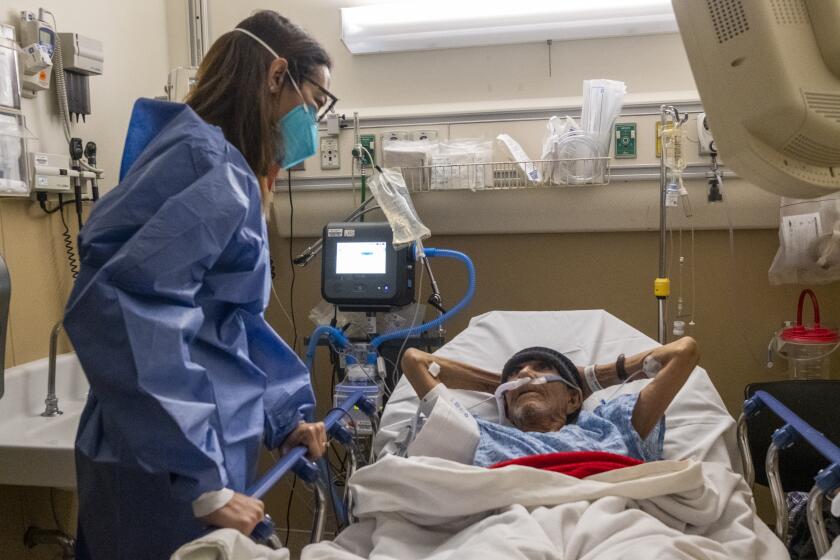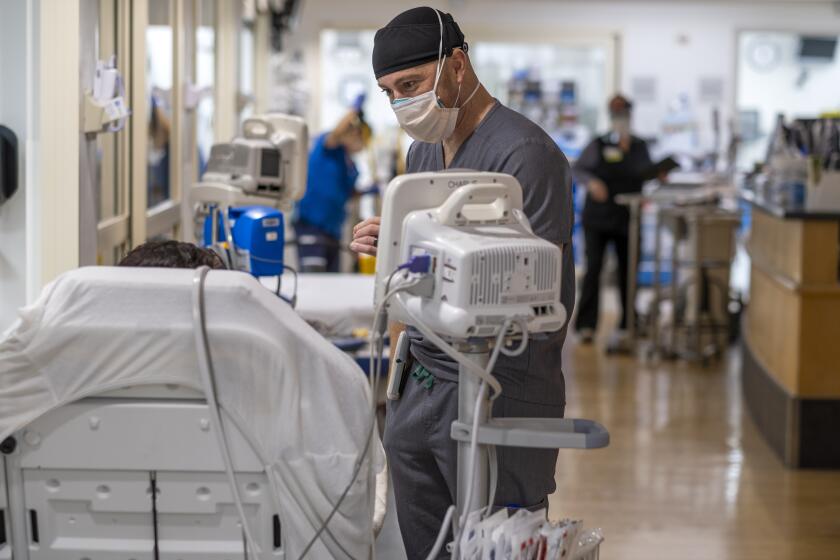Petition opposing Stanford’s COVID-19 booster mandate draws 1,800 signatures

- Share via
More than 1,800 people have signed a petition calling on administrators at Stanford University to repeal their COVID-19 booster vaccine mandate for students.
The petition, created last week by 23-year-old PhD student Monte Fischer, quickly gained the attention of students, alumni and professors opposed to the university’s Dec. 16 order, which requires that all students provide proof of a booster dose by the end of the month, exempting only those with approved religious or medical exemptions.
“We are not anti-booster or anti-vaccination,” Fischer wrote in the petition. “We are pro-bodily autonomy, and support the rights of Stanford students to evaluate the data and make their own medical choices.”
More than 95% of Stanford’s students have been vaccinated against COVID-19, according to the university’s dashboard, which does not include booster data. Stanford has led several clinical trials of COVID-19 vaccines.
University spokesman E.J. Miranda said the booster requirement is intended to “support sustained immunity against COVID-19 and is consistent with the advice of county and federal public health leaders.”
“A high level of immunity within our student community will help us continue in-person educational activities and puts us in a better position to deal with the risk of future variants, especially in our students’ congregate living settings,” Miranda said.
Stanford University will require students to show proof of COVID-19 booster shots by Jan. 31.
Stanford is not the first university to institute such a policy. Others include several University of California campuses and USC. The University of Chicago, Cornell and George Mason University have announced similar booster shot requirements, and were also met with similar petitions calling for their repeal.
Meanwhile, the governor of Hawaii this week announced that he was considering changing the state’s definition of “fully vaccinated” from two doses to three for visiting travelers, while the San Jose City Council recently approved a booster shot requirement for all municipal employees and people attending large indoor gatherings.
Fischer, the student who created the Stanford petition, said Wednesday that he has received the COVID-19 vaccine but has not yet received a booster shot. His opposition was not to the shots themselves, but to what he described as the university’s “paternalistic decision.”
“The boiled-down argument is that the Stanford student body is fully vaccinated and young, and therefore by any reasonable assessment of the evidence, we’re at very low risk from a serious illness from COVID,” he said, adding that he considers the decree “an unnecessary medical intervention that should be left for students to decide themselves.”
Among the items outlined in the petition are questions about the ability of booster shots to prevent infections from the highly transmissible Omicron variant.
Dr. Peter Chin-Hong, a UC San Francisco infectious-disease expert not affiliated with Stanford, said that’s missing the bigger picture.
“At the end of the day, the eyes-on-the-prize is not infection prevention — it’s prevention of serious disease and keeping people away from the hospital so we can take care of people who don’t have COVID,” he said.
Chin-Hong said booster requirements are a “very powerful ally” that should not be eliminated as universities work to increase the safety of their environments, which are often home to immunocompromised people and those with comorbidities unrelated to their age group.
UCSF’s own mandate requires all staff and students to get their booster by Jan. 31.
The rise in reported cases is the fastest accumulation of infections in the history of the pandemic.
The petition also includes concerns about “known risks” from booster shots, including an increased risk for vaccine-induced heart inflammation among men ages 16 to 29, as well as concerns about the waning efficacy of boosters over time.
“It is wrong to hold young people’s futures hostage in order to force them to receive novel medical treatments that they do not want,” the petition says.
While vaccine-induced heart inflammation, or myocarditis, is indeed a risk for that age group — to a degree of 1-in-10,000 by some studies — Chin-Hong said that the risk of myocarditis is 16 times higher for people with COVID-19, and that the outcome of the inflammation for those people is much worse: Vaccine-associated myocarditis typically involves a quick recovery and has not been associated with any fatalities, while COVID-19-associated myocarditis can be lethal, he said.
And while boosters do wane, the protection afforded by three shots is undoubtedly higher than that afforded by two, Chin-Hong said, noting that many other vaccines — including those for measles, mumps, rubella, Hepatitis B and HPV — rely on three doses.
“Biologically, it makes sense: You have a one-two punch, and then you remind the immune system a few months later,” he said. “This is not a new concept, so anybody who is in an uproar over boosting should just go back and think about what they’ve done in their own lives for other vaccines.”
Last week, California averaged 52,000 hospital patients daily, just under the 55,000 hospitalized for all reasons during last winter’s COVID-19 surge.
Not everyone agrees. Fischer said he has received positive feedback from some experts and faculty members, including Stanford health policy professor Jay Bhattacharya, who tweeted support for the petition and gratitude for Fisher’s call to “let the winds of freedom blow again.”
“To my discredit, I have been reluctant to engage in local advocacy, in part because of the stifling, hostile atmosphere to dissent against lockdowns and mandates,” Bhattacharya wrote. He did not respond to a request for comment Wednesday.
Fischer said that the response from the campus community has been largely supportive and that he has not received “any direct pushback.” He hand-delivered the petition to university officials Tuesday. He said they have not given him a formal response.
“One should always be ready to change their mind in the face of evidence,” Fischer said. “That’s what I’m asking the administration to do as well.”
In December, officials in Santa Clara County, where Stanford is located, announced that all workers in high-risk settings such as hospitals and skilled nursing facilities will be required to obtain booster shots, mirroring state orders.
During a news conference about the change, the county’s health director, Dr. Sara Cody, pleaded with the public to get vaccinated and boosted against COVID-19.
“We know that the protection from the initial series of vaccine does wane over time,” she said. “It’s really important to get boosted, and boost your level of protection back to where it needs to be to weather this surge.”
Stanford started its winter quarter with two weeks of online instruction, and will continue to require regular coronavirus testing for students and staff on campus, the university said.
According to its dashboard, testing from the week of Jan. 10 identified 205 new coronavirus cases among students and 287 cases among staff.
As of Monday, 325 students were isolating in student housing.
More to Read
Sign up for Essential California
The most important California stories and recommendations in your inbox every morning.
You may occasionally receive promotional content from the Los Angeles Times.













